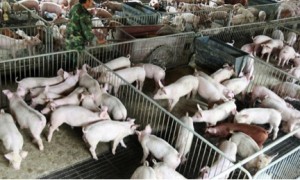The reality of cloning is now a global phenomenon, and as technologies improve the possibility of human cloning becomes more plausible. The use of cloning to manufacture, as mentioned by both Leon Kass and David Elliot in Arguing about Bioethics, exists in the realm of animal technologies, and eerily, China is now cloning pigs on an “industrial scale” (www.bbc.co.uk/news/). The photo below depicts the mass production of pigs that is now possible due to genetic cloning. Therefore, there is only a short time until human cloning is efficient and safe enough to enter the market place. Interestingly within the United States, individual states take different stances on cloning, and cloning boundaries are blurred across the nation. (www.ncsl.org, bdfund.org ). As technological advances further blur lines, there needs to be conversation on the moral boundaries of cloning as a form of “assisted reproduction,” and critical engagement is necessary to translate moral standards into public policy that will govern scientific procedures.

Cloning takes the discussion of human experimentation another step further, and challenges the ethical line of human subject experiments. The first cases of cloning would be all encompassing biological, genetic, social, and procreation experiments. Science has already taken baby steps towards further human experimentation such as cloning through techniques like prenatal genetic screening and parental genetics testing. This brings up debates about selection, the power of positive selection, and what can be categorized as too much selection (Holland 153) David Elliot in “Uniqueness, Individuality, and Human Cloning” presents a weak objection to the manufacturing argument, and instead he argues, “It can simply be a choice to have a child of one’s own in the only way possible” (Holland 153). Elliot’s counterargument against the manufacturing objection highlights defendable and seemingly reasonable motivations for cloning, such as infertility or genetic diseases, and he overlooks unreasonable motivations for positive selection, such as for control over sex, intelligence, or beauty. This reasoning treads a dangerous path, and the President’s Council on Bioethics warns “hard cases can make bad laws” (bioethics.georgetown.edu). Therefore, it is essential to look beyond the logical and sensible cases that seem to necessitate cloning, to cases of inappropriate and dangerous motivations. Difficult life circumstances relating to fertility can blind a society, or an individual, of the moral implications of bringing new life into this world (bioethics.georgetown.edu).
Thus, evaluation of cases of cloning will involve prudence. There are recognizable and defendable motivations to clone in order to produce a child, but no one can articulate how much control and design selection amounts to a product, rather than a child. Tough cases can make bad laws, and it will be a societal test for how justifications like those presented by Elliot will affect public policy and laws.
Joyelle Flemming in her previous blog post brings up interesting considerations about the repercussions of cloning on the future. While in time our generation or future generations may come at accept cloning as a form of reproductive assistance, how will this impact future generations and the relationship of science and society? Cloning conversations must address the implications on the future and how man-made selection through cloning will effect the development of the human species as well as the world. While there is no perfected cloning technique to date, considerations of the morality of cloning should address cloning in context to the present as well as projected techniques.
Sources:
Elliot, David. “Uniqueness, individuality, and human cloning.” Arguing about Bioethics. London: Routledge, 2012. Print.
“Human Cloning Laws.” Human Cloning Laws. National Conference of State Legislatures, Jan. 2008. <http://www.ncsl.org/research/health/human-cloning-laws.aspx>.
“Human Cloning and Human Dignity: An Ethical Inquiry — Full Report.” PCBE: Human Cloning and Human Dignity: An Ethical Inquiry — Full Report. The Presidents Council on Bioethics, July 2002. Web. <http://bioethics.georgetown.edu/pcbe/reports/cloningreport/children.html>.
Kass, Leon R. “Why We Should Ban the Cloning of Humans: The Wisdom of Repugnance.” Arguing about Bioethics. London: Routledge, 2012. Print.
Nikas, Nikolas T. “Human Cloning Laws: 50 State Survey.” Bioethics Defense Fund, 19 May 2011. Web. <http://bdfund.org/wordpress/wp-content/uploads/2012/07/CLONINGChart-BDF2011.docx.pdf>.
Shukman, David. “China Cloning on an ‘industrial Scale'” BBC News. BBC, 14 Jan. 2014. Web. 26 Jan. 2014. <http://www.bbc.co.uk/news/science-environment-25576718>.